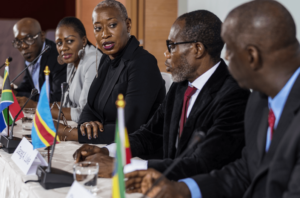Africa is a continent of immense beauty, diverse cultures, and remarkable potential. Yet it faces a myriad of pressing challenges that have persisted for decades. From poverty and political instability to healthcare and education disparities, the hurdles are numerous and complex. In this blog post, we will delve into the keys that can unlock Africa’s potential and drive meaningful change across the continent.

Education
In the vast and diverse continent of Africa, education holds the key to progress and prosperity. It is the cornerstone upon which nations build brighter futures and empowered communities. Yet, the reality on the ground is that many African countries are grappling with a stark and persistent challenge – inadequate access to quality education.
This educational disparity manifests in various forms, from limited access to schools and educational resources in rural areas to overcrowded classrooms and a shortage of qualified teachers in urban centres. The result is an educational landscape that leaves many children and young adults without the opportunity to unlock their full potential.
To resolve this pressing challenge, a multi-faceted approach is essential. First and foremost, it requires substantial investments in educational infrastructure. Building and maintaining schools, equipping them with essential learning materials, and ensuring access to a safe and conducive learning environment are fundamental steps towards bridging the educational gap.
Economic Growth
Economic growth is a crucial key to resolving Africa’s challenges. High unemployment rates, income inequality, and poverty remain persistent issues. To overcome these obstacles, African nations must promote entrepreneurship, attract foreign investments, and create a conducive environment for businesses to thrive. Encouraging innovation and diversifying economies can lead to sustainable economic growth and ultimately improve the standard of living for millions.
Healthcare
Access to quality healthcare is a fundamental human right, yet many African countries continue to grapple with inadequate healthcare systems. The key to resolving this challenge lies in comprehensive healthcare reforms, increased funding, and a focus on preventive care. A healthier population is not only more productive but also happier, and it paves the way for broader societal advancements.
Infrastructure
Insufficient infrastructure, including roads, electricity, and sanitation facilities, is a major impediment to Africa’s development. By investing in infrastructure, African nations can boost economic productivity, facilitate trade, and improve living conditions. A well-planned and executed infrastructure development strategy is a vital key to resolving the continent’s pressing challenges.
Governance
Effective governance and political stability are indispensable in addressing Africa’s challenges. Corruption, political instability, and governance issues have hampered progress for years. Implementing transparent and accountable governance structures, promoting democracy, and respecting the rule of law are essential keys to ensuring Africa’s long-term stability and development.
Agriculture
Agriculture is the backbone of many African economies, providing livelihoods for millions. However, outdated farming techniques, climate change, and land degradation pose significant challenges. Implementing sustainable agricultural practices, modernizing farming methods, and improving access to markets can help Africa overcome food insecurity and drive economic growth in rural areas.
Gender Equality
Achieving gender equality is not just a moral imperative but also an economic necessity. Africa’s development hinges on the active participation of women in various sectors. Promoting gender equality through legal reforms, educational opportunities, and economic empowerment is a key to unlocking Africa’s full potential.
Sustainable Development
As Africa seeks to resolve its pressing challenges, it must also address environmental concerns. Climate change, deforestation, and resource depletion threaten the continent’s future. Implementing sustainable development practices, reducing carbon emissions, and protecting natural resources are essential keys to securing a brighter, more sustainable future for Africa.
International Cooperation
In addition to the keys outlined, international cooperation and partnerships play a vital role in resolving Africa’s challenges. Collaborative efforts with global organizations, governments, and NGOs can provide the necessary resources, expertise, and support to accelerate progress and address pressing issues more effectively.
Resilience and Innovation
The ability to adapt to changing circumstances and innovate in response to new challenges is another critical key to Africa’s success. The continent’s resilience in the face of adversity and a culture of innovation are assets that can drive progress and overcome obstacles, no matter how daunting they may seem.
Conclusion
Africa’s pressing challenges are multifaceted and complex, but they are not insurmountable. By focusing on education, economic growth, healthcare, infrastructure, governance, agriculture, gender equality, and sustainable development, the continent can unlock its vast potential and create a brighter future for its people. It’s a journey that requires dedication, collaboration, and innovation, but the keys to resolving Africa’s challenges are within reach.
You will find the following useful: